When we miss someone, we find refuge in memories. This way, at a blink, we can be with them again. Images and moments follow one another in our thoughts, instants of life intertwine. Absence becomes presence, while we close our eyes to savour these visions of the past. Riding the waves of time, we might let out a smile or a tear tinted with melancholy. The first moments we relive are episodes embedded in our memory, days or seconds that for personal reasons will remain indelible. When we venture on this mental journey, we feel like we can actually hear the voice of that person. Scenes of ordinary life that seemed irrelevant at the time spring to mind: lunch at home, a walk, an evening on the couch in front of the TV. We now know how special those moments were. Sometimes, a shadow emerges among the memories to dim the light of their serenity. And we are abruptly thrown into that chaotic and confused photo album built around a word only: cancer, the illness that took from us the possibility to ever be able to hug our loved one again. An album too intimate to try to describe it. Fragile and delicate pages we wouldn’t want to leaf through. Who has one, hidden or carefully stored inside themselves, can understand the feeling, and how to enter that introspective dimension.
Today we celebrate World Cancer Day, an initiative dedicated to all people who are facing this illness and know the meaning of that photo album. Not only that: this world day, promoted by the Union for International Cancer Control and supported by the WHO, calls us to a reflection on what we can all do to fight cancer, addressing institutions, experts, patients of any age and their families. The 4th February celebration, in fact, wants to draw attention to the importance for both the individual and the community of acting in order to prevent cancer and to improve access to cancer screening. “The objective,” says the Ministry of Health, “is to try to save lives by raising awareness on the illness, so that people recognise the symptoms, keep themselves checked and avoid behaviours placing them at risk”. The World Cancer Day’s slogan for the years 2019-2021 is I Am and I Will, an invitation to action and commitment at personal, social and institutional levels.
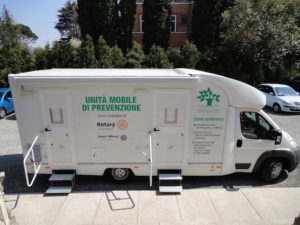
To look into the theme of cancer, we had a conversation with Viola Erdini (in the cover picture), the president of the Edo and Elvo Tempia Foundation. The Biellese organisation, established in 2005, operates in an integrated and synergic manner with the volunteering association Fondo Edo Tempia Onlus, and in collaboration with local health services, universities and research centres in order to support and improve Regione Piemonte’s cancer programmes. Specifically, the foundation deals with aspects like prevention, early diagnosis, screening, research, molecular oncology, palliative care, psycho-oncology, and contributes to the public health service, the cancer registry, communication and education, relying on professionals employed by the foundation itself or made available by local health services. In brief, it carries out initiatives of social utility in the assistance and health sectors for the protection of human wellness in the oncologic field. The volunteering activities are managed by Fondo Edo Tempia, created in 1981 by Elvo Tempia (Viola’s grandfather) to fulfil the last wish of his son Edo, who died of a melanoma at the early age of 35: the institution of an association that could give an important contribution towards the care of cancer sufferers and their families. Let’s find out more about this organisation through the words of Viola Erdini.
The World Cancer Day aims at raising awareness on the theme of cancer to encourage prevention, diagnosis and treatment. What is the value of this celebration on social and health levels?
It is extremely important, because early diagnosis, i.e. secondary prevention, remains one the key actions allowing to deal with the illness with timely and targeted medical interventions. An early diagnosis is still the most effective way to increase the probability of success of the therapy. Primary prevention is fundamental, not only for cancer, in fact, but for all pathologies. When we talk about cancer prevention we generally refer to primary and secondary prevention, whereas the third aims at preventing the illness from recurring. A higher level of awareness and responsibility is also essential, because we need to realise that a lot can be done on a daily basis to prevent illnesses. Genetics and the quality of the environment we live in are definitely relevant factors, but we can improve our health by making sure that both our body and our soul maintain a psycho-physical balance. Chronic stress is in fact a negative factor which weakens our organism. We must keep in mind that smoking, drinking alcohol, lack of exercise and unhealthy eating increase the risk of developing illnesses. I am very keen to stress these issues, because they are talked about, but not enough.
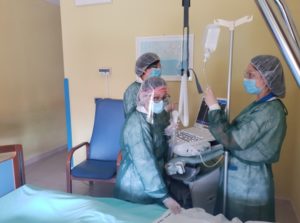
The hospice during the first Covid-19 emergency.
One of the indirect effects of the pandemic has been the considerable delay it has caused to medical tests, specialist visits and surgeries. How much has the Coronavirus affected prevention? Will the rollout of vaccines solve this problem?
It has dramatically affected prevention, not only for cancer but for all pathologies. With the exception of urgencies, health services have mainly been dealing with Covid-19. At first it caused delays to diagnoses: cancer screening was suspended for three months in which no checks could be carried out, then there was a big effort to make up for time lost. Our early diagnosis clinic was reactivated – with all the necessary precautions – as soon as the first lockdown was lifted. In addition to the inevitable delays to diagnoses, the pandemic has been a concern for many people, who often prefer not to go to hospitals and clinics for their checks not to risk contracting the virus. I think it is too early to have an opinion on the subject of vaccines, different factors are at play. The health operators of our association have already all been vaccinated as part of the first phase of our regional vaccine programme. Considering the particular historical moment, we are not talking enough about what is good for our health in light of the fact that we are spending much more time at home, and, as a consequence, cases of depression have increased. In this regard, we have to try to eat healthy and dedicate a bit of time to exercising and listening to music every day, which are useful activities for our wellbeing.
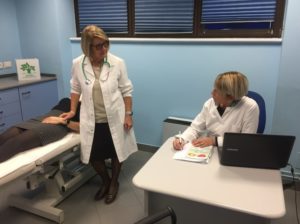
Dr Adriana Paduos and nurse Giovanna Genta in the clinic for the early diagnosis of cancer.
What was the most common type of cancer in 2020 in Biella? Do these data reflect national statistics?
Viola Erdini referred the question to Adriana Paduos, medical director of the Edo and Elvo Tempia Foundation, editor’s note.
The most common types – explained the doctor – are breast, prostate, intestine and lung cancer. In Biella, the most common malignant cancer is breast cancer, with over 150 patients a year. A considerable number, considering that the figure is similar to that of patients suffering from colon-rectum cancer, which affects both sexes, not only women. The numbers are high in our territory, but the figures reflect national statistics, it is not true that there are more cancer sufferers in the Biellese territory. Said that, in order to give a specific analysis we should consult the cancer registry and then contextualise the data, because the factors and causes to take into consideration are many.
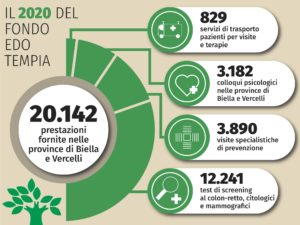
When the mass media build a narration about oncologic patients, they tend to use words from the world of war to describe them, often using terms like ‘fighter’ or ‘warrior’. What do you think about this stoic connotation attributed to the cancer sufferer?
I don’t think we should be talking of ‘fight against cancer’ and use terms recalling a war-like situation. It might have been appropriate time ago, when we didn’t know enough about the illness, which was therefore seen as an enemy attacking from the outside. We now know it much better, and we have realised that it is somehow part of us, being a transformation happening inside us, and it would be like thinking of being at war with ourselves, which doesn’t make sense. A war language is not suitable and can sometimes be counter-productive: calling a patient ‘a warrior’ means charging them with a responsibility which might not help them in their healing process. It is in fact important to observe and embrace our fears and approach the illness in our own personal way, without using masks or labels. By the same token if a person is more comfortable with dealing with the illness feeling ‘a warrior’ they must be free to do so. I think that this fight should be faced on a cultural level, through awareness campaigns for a responsible social and political transformation on the subject of cancer and prevention.
Fondo Edo Tempia engages with cancer research and treatment in all their aspects, with interventions ranging from regional screenings to genomic and molecular oncology analyses, from psycho-oncology to palliative care. What are your objectives for this year and for the future?
The objective is to be able to take people into our care offering them integrated assistance, at the same time continuing to do research and prevention, therefore providing support at 360 degrees. We want to accompany cancer sufferers along their therapeutic course, generating the awareness the patient needs to deal with the illness and to heal in both body and mind.
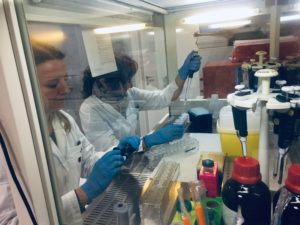
The genomic laboratory.
What is your foundation’s contribution to cancer research?
We have two genetic laboratories. One is in the Fondo main building and deals with basic and applied research studying the genomic of the different types of cancer in collaboration with other national and international centres; research is in fact something that can be done only by joining forces. The second laboratory is housed within Biella’s hospital and provides molecular analysis of patients’ cancer tissues in terms of prediction, diagnosis and therapy. This way we can identify the most effective cures, hence avoiding patients having to assume too many drugs, also with savings for the public health service. As far as clinical research is concerned, for years we have been collaborating with Biella’s Oncological Centre by sharing a data bank helping with research focused on pharmacological treatments and patients. It is also essential to provide an all-encompassing care of the person with personalised cures, taking into consideration both physical and mental aspects. With regard to the latter, psycho-oncology allows us to give continuing support to patients and their families from a psychological point of view, facilitating an emotional transformation that enables adjustments to their inner self. In addition, we also offer patients a series of physical activities generating spiritual wellbeing, like yoga and Tai Chi, and we have organised several meditation seminars held by professor Gioacchino Pagliaro, with scientific evidence that they are effective in releasing stress and, as a consequence, in strengthening the immune system, which helps the patient better respond to therapies.
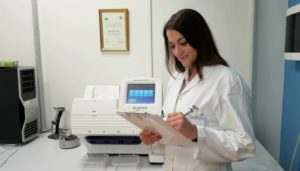
Maria Scatolini, director of the molecular oncology laboratory.
When people are diagnosed with cancer, no matter what type, hope is the immediate reaction. The extinguishing of its flame marks the beginning of a long journey towards the abyss. Is there a way to feed it or keep it alive even in dramatic situations? And if there is, how?
The end of one’s life is a delicate and complex theme each person faces in a different way. We have recently been dealing with this sensitive issue at the Centre for the promotion of palliative care of Regione Piemonte, coordinated by Oscar Bertetto and Marina Sozzi. We too have been working on palliative cures for over thirty years, providing Biella’s section of health services offering this type of medical assistance at home with extra doctors, nurses and psychologists; while on behalf of Vercelli’s health services we have been managing the hospice of reference for the Vercelli territory, located in Gattinara, since 2009; ensuring there too home medical assistance. Since we started running it, the hospice has been called ‘Casa Tempia’, with the objective of making our guests (terminally ill patients) feel as much as possible as if they were in their homes, and not in a health or hospital structure. I would place the hope you mentioned earlier next to the concept of quality of life: I think how long someone has left to live is as important as how they are going to spend this time. One of our commitments is actually to assessing what we can do to maintain life reducing pain even in conditions as difficult as the terminal phase of the illness. This is a subject most people find very scary: the theme of death is taboo in our culture and society because of our fear of the unknown. Whereas we should be able to learn as children how to deal with death: if it were presented to us using a suitable language that made us experience it as a life passage, we wouldn’t be so scared of it. Invited to participate in a conference on this subject, Paljin Tulku Rinpoche, the Lama of the Buddhist monastery in Graglia, explained that there is no mourning in their religion, as throughout their whole existence Buddhists are aware that death is a passage to a better life, a thought that has always stayed with me. The family will of course miss the loved one, but embracing such a concept helps cope with these difficult moments from a different mindset.
Even in the most delicate cases, doctors must inform patients of their real health conditions. In addition to their professional vocation, doctors rely on their empathy when it comes to disclosing the most critical test results, but some experiences show that news is not always communicated with enough tact. Medical staff sometimes lack that sensibility that should be inseparable from their professionalism, almost neglecting the fact that not only what they say but also how they say it matters. In a profession dedicated to the care of others, shouldn’t the emotional side of it be more relevant?
Definitely! Medicine is still very much divided in sectors and it often forgets how important a holistic approach to a full analysis of the person is, all the components need to be taken into consideration: how the patient lives, what they think and what they do in their daily lives. It is a complex work that, I realise, requires a lot of time, something health care operators unfortunately don’t have enough of in our current hospital system. It should always be remembered that, as human beings, we are complex machines. In this regard, doctors should operate on two levels: they must always tell the truth, but at the same time have the ability to understand what the best way to communicate it to each patient is. I think that this psychological aspect should already be integral part of a doctor’s university education, which would provide the student (future doctor) with the skills to establish the best possible relationship with the patient, in order to help them face their journey in the most appropriate manner and using a suitable language. Of course the level of empathy depends very much on the person, but it is also something people can work on.
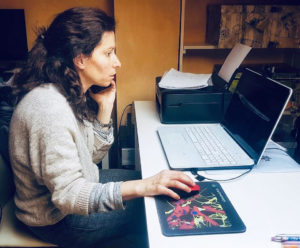
Paola Minacapelli, psychologist for Fondo Edo Tempia.
What advice would you give people who have a history of cancer in their family? You have mentioned early prevention, balanced eating and healthy habits, what else can be useful?
They need to consider what illnesses have affected their families and participate without fear in the screening programmes organised by the national health system. Our lifestyle must be our top priority, in particular we have to understand that it is essential to take care of our spiritual and energetic components, not only of our physical body. As quantum physics teaches us, matter is made of energy, which supports our every organ and whose frequency level can be maintained through suitable activities. There are practices that reduce stress, like Qi Cong, which benefits cancer sufferers but also people who want to prevent the illness. On this subject, I want to anticipate that this year too, in spring, we will organise Qi Cong lessons at Bosco del Sorriso, in collaboration with Oasi Zegna.
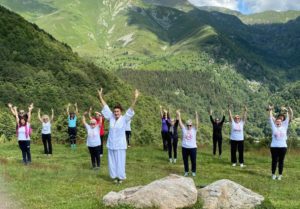
A Qi Cong lesson led by Natalina Bassetto at Oasi Zegna.
Oncologic patients are not the only ones to have to face the illness: family and friends experience the therapeutic journey alongside their loved one. An emotional process often causing a more or less constant pain that we don’t know how to relieve. How can we help also who is at the patient’s side? It is not easy to give form to the expression ‘stay close to someone’ when we are personally involved in this sort of situations.
It is very difficult. We have had a support centre since 1995, through which we help people by listening to them in individual or groups meetings, this way offering psychological assistance to families too. For over ten years we have also run Progetto Bambini dedicated to children, who must be cared for in a different way from adults. It proposes initiatives – like art therapy, music therapy, yoga and other activities – for both children suffering from cancer and children with a cancer sufferer in their family. We regard psycho-oncology as a fundamental support, requiring specifically trained personnel, not only professional psychologists.
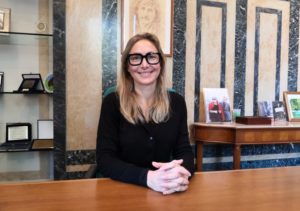
Viola Erdini.
What does it mean for you to be the president of an organisation named after your uncle and grandfather? What contribution have you offered so far and will you offer in the future to Fondo Edo and Elvo Tempia?
I am taking this demanding and difficult task very seriously, because I want to carry it out with great care, and this requires a strong sense of responsibility and, sometimes, sacrifices. I had a wonderful and special relationship with my grandfather and he is always in my thoughts, together with the tremendous opportunity I have to help people in need. I want to develop his project at the best of my abilities, in the awareness that it is a very complex assignment. I am doing all I can, I might get things wrong sometimes, as everybody, but I always do it with passion, without ever holding back.
People like Viola help keep our hope in the future alive. There is no need for proclamations or titles: when professionalism and solidarity meet prevention and awareness, an illness can be experienced in a totally different way. The dream of Edo and Elvo Tempia has already become reality.

